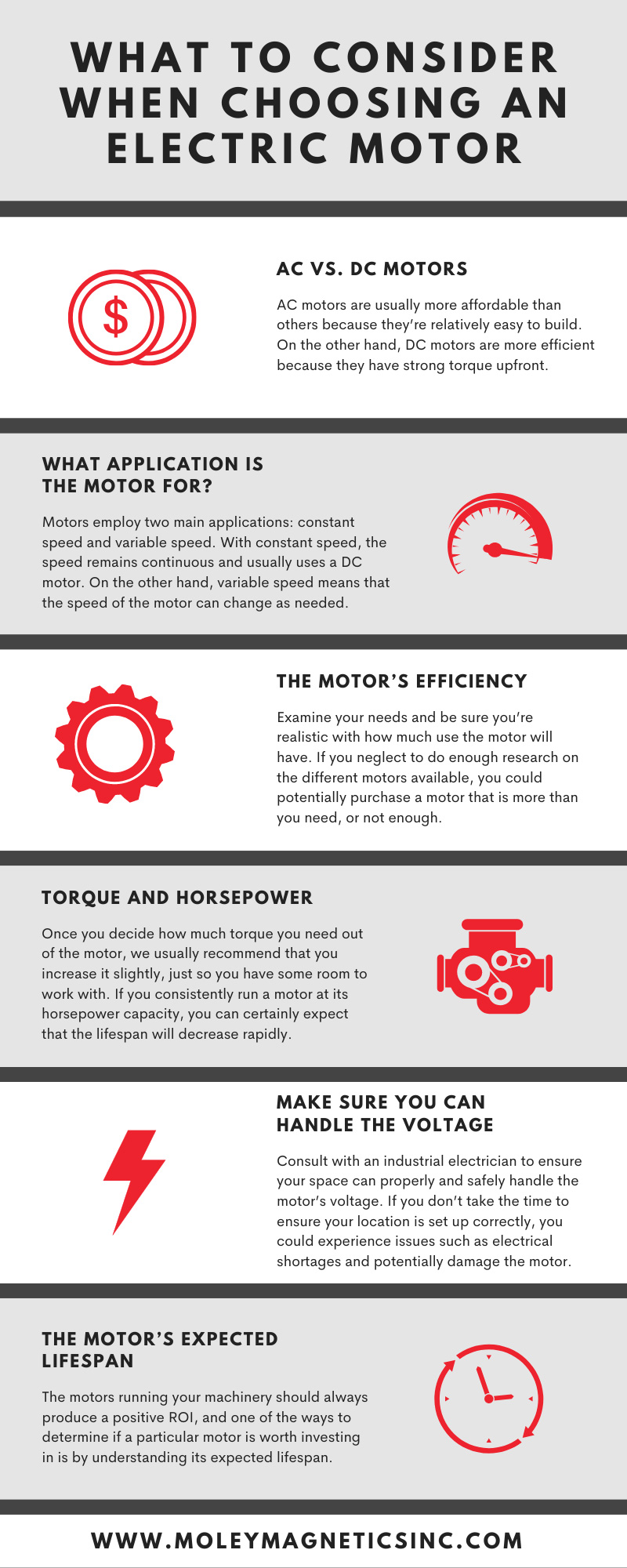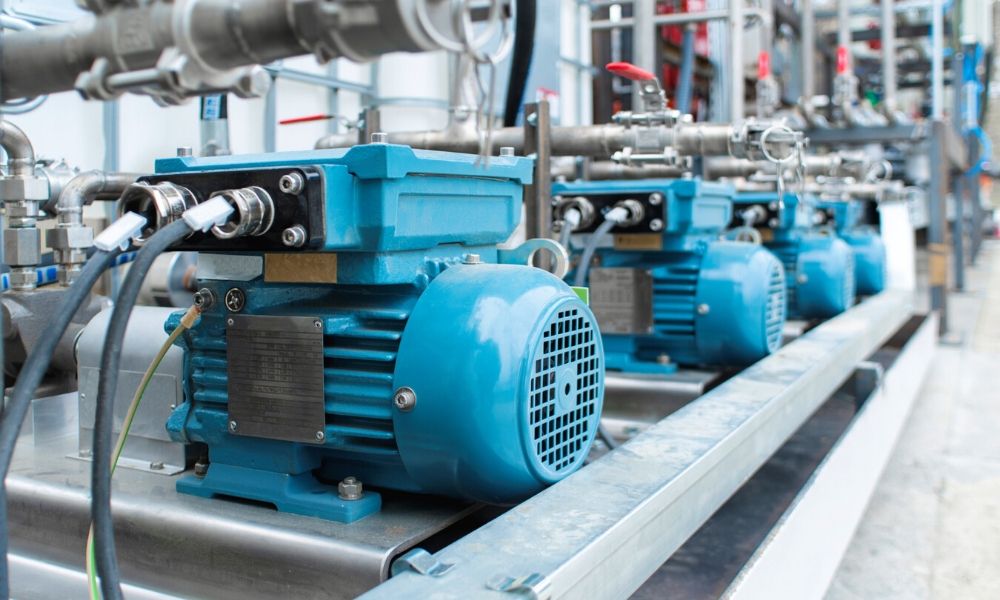Electric motors allow businesses to operate more smoothly by having more-efficient machines. The motors help machines of all different kinds operate at their best, and it’s critical that each machine has the appropriate motor. If a machine’s motor doesn’t have enough torque or voltage available, the motor could overheat or even damage the machine. However, there are many other factors to keep in mind before purchasing a new electric motor. So if you’re in the market for an electric motor, we strongly encourage you to continue reading so you know what to consider when choosing an electric motor.
AC vs. DC Motors
Before you can begin considering an electric motor, you need a general understanding of the common types of motors. The first is an AC motor, which stands for alternating current. AC motors are common for a few reasons, the first being affordability. AC motors are usually more affordable than others because they’re relatively easy to build. Not to mention they’re among the most universal types of motors. AC motors come in two common types: single-phase and three-phase. A single-phase motor relies on the amount of power in order to control its torque, and because single-phase motors rely on electrical power, they’re often less powerful than three-phase motors. Alternatively, three-phase motors are more common in industrial settings because they run off higher electrical power.
On the other hand, DC motors—which stands for direct current—are more efficient because they have strong torque upfront. DC motors are common for any application that requires high power; however, because of their high power, DC motors can require more maintenance than their AC counterparts.
What Application Is the Motor For?
Motors employ two main applications: constant speed and variable speed. With constant speed, the speed remains continuous and usually uses a DC motor, but AC motors are suitable as well. You can expect to find constant speed applications in many industrial settings. On the other hand, variable speed means that the speed of the motor can change as needed. You can find variable speed motors in air conditioners, elevators, and in industrial settings. Once you’ve identified the type of motor and the application, you can start getting into the specifications of each motor.
The Motor’s Efficiency
Inefficient employees cost the company money because they’re wasting time; the same goes for inefficient motors. Choosing an efficient motor based on your needs can help you save both time and money. For example, each company has a different use for its motors. Consider a 24/7 manufacturing facility, which probably will need a DC motor with constant speed in order to work efficiently. On the other hand, a residential high-rise in New York may choose an AC motor with variable speed because the elevator’s use will significantly decrease after rush hour. Examine your needs and be sure you’re realistic with how much use the motor will have. If you neglect to do enough research on the different motors available, you could potentially purchase a motor that is more than you need, or not enough.
Torque and Horsepower
Similar to the motor’s efficiency, the torque and horsepower play a big role in the motor’s efficiency. Once you decide how much torque you need out of the motor, we usually recommend that you increase it slightly, just so you have some room to work with. If you consistently run a motor at its horsepower capacity, you can certainly expect that the lifespan will decrease rapidly. Think of the horsepower and torque like a credit card. You should avoid maxing out, or even getting close to maxing out, your card because it has negative consequences. Similarly, negative consequences will result from maxing out or nearly maxing out your motor.
Make Sure You Can Handle the Voltage
Some motors can run on batteries, but most motors plug into outlets. However, some locations don’t have the correct wiring and infrastructure in place to run the higher voltage. Before you plug the motor into the outlet, we recommend consulting with an industrial electrician to ensure your space can properly and safely handle the motor’s voltage. If you don’t take the time to ensure your location is set up correctly, you could experience issues such as electrical shortages and potentially damage the motor.
The Motor’s Expected Lifespan
Anytime a company invests in capital expenditures, they look for the highest return on investment, or ROI. The motors running your machinery should always produce a positive ROI, and one of the ways to determine if a particular motor is worth investing in is by understanding its expected lifespan. Going back to the manufacturing example, you can roughly calculate the ROI of the motor based on how many widgets it’ll help you produce. However, you should take into consideration the lifespan of the motor; some manufacturers make very cheap motors that only last five years or so. Other manufacturers make excellent industrial electric motors that last, ultimately giving you a larger ROI.
Many companies utilize a motor somewhere in their operations, and even if you maintain the motors well, they still need replacement occasionally. If you’re in the market for a new motor in your manufacturing facility, residential building, hotel, or elsewhere, keep in mind several factors before you purchase an electric motor. Failing to do your research can lead to lost profits for your business, damaging your equipment, and of course, wasting money.
Here at Moley Magnetics, we’re a family-owned business that started as a small operation out of our garage. Our family takes pride in the products we sell, which is why from our family to yours, we guarantee great products. Since the launch of Moley Magnetics, we’ve grown exponentiality and have become experts in our industry, and through our expertise, buy cheap generic valtrex we’ve developed the highest quality products available. In addition to our products, we can repair your existing motors and help you succeed. If you don’t know which motor would be best for your needs, contact us today, and we’ll be happy to help you find the right motor for you.



